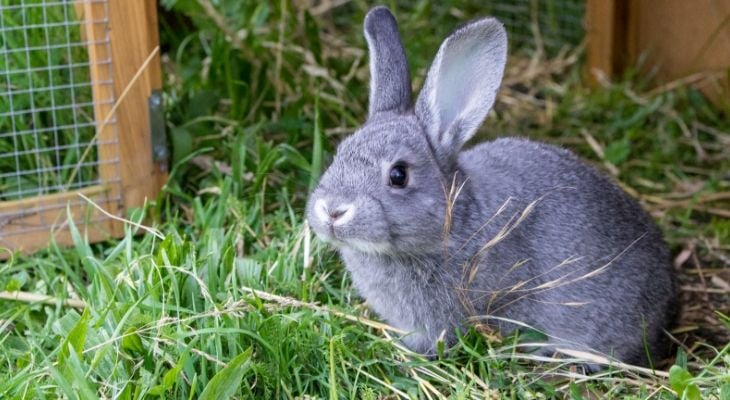
Food
Feeding pet rabbits is easy because nutritionally complete and balanced commercial pelleted diets are readily available. One of these pelleted diets and fresh water are all a pet rabbit requires. The pellets should be offered at all times unless overeating and obesity have become problems. The pellets should be as fresh as possible when purchased and should be purchased in relatively small quantities. The pellets should be stored in the refrigerator to prevent premature spoilage. Pellets that will probably not be used within 2 months of purchase should be frozen immediately after purchase. Refusal to eat rancid pellets is a relatively common cause of inappetence among rabbits.
Clean, fresh water also should be available at all times. Fresh water should be offered daily, either in a bottle or in a heavy ceramic dish that cannot be easily overturned. Many hobbyists find the hanging drop-style bottles most satisfactory. The water container, regardless of the type used, should be thoroughly cleaned and disinfected at least every 1-2 days.
Good quality hay, grass, alfalfa or clover and/or grass clippings should be offered daily. Some researchers believe this practice reduces intestinal problems and the tendency to pull out and chew on hair. Other food items (lettuce, spinach, alfalfa sprouts, carrot tops, beet greens, carrots, apples, etc.) can be offered in small amounts daily. These food items should not be offered in larger amounts because they are water-rich and lack the nutrient density of the pelleted diets. Furthermore, many rabbits develop a preference for these items over pellets if they are offered in large quantity.
Some rabbit owners provide salt licks for their pets, but experts do not regard this addition as a necessity. Many rabbits love to gnaw and chew on their cage and on items within the cage. A well-boiled roundsteak bone (marrow removed) and/or small dog chew toys are often accepted as challenging gnawing substitutes. Many veterinarians recommend adding pineapple or pina-colada yogurt to the daily diet. Most rabbits willingly accept the yogurt, especially if they are introduced to it at a young age. Yogurt not only promotes and maintains the normal bacterial flora within the digestive tract, but the pineapple contains an enzyme (papain) that is thought to help dissolve any hair that has been eaten.
Rabbits engage in relatively uncommon but normal behavior when they deliberately eat small, soft, moist (often mucus covered), light green fecal pellets directly from the anus. These special night stools are especially rich in protein, vitamins and minerals. Rabbits must obtain these nutrients in this fashion. This behavior is most often carried out in the early morning hours and is rarely observed by rabbit wners. Sometimes, however, they choose not to eat the night pellets, and you may notice these slightly different droppings in the morning.
Housing
Rabbits can be housed indoors or outdoors. Indoor rabbits should be confined to a suitable enclosure when their activity cannot be adequately supervised. A roomy wire cage with at least one-half of the floor's surface area covered with Plexiglas or washable towels is recommended. The Plexiglas or towels provide relief from constant and continual contact with the wire floor, helping to prevent hutch sores on the feet. A water bottle or ceramic crock, food dish and a litterbox should be provided for the rabbit inside the enclosure.
Under no circumstances should rabbits be allowed total freedom within the home. Rabbits love to chew and can be very destructive to household furnishings. Furthermore, they can be seriously injured by biting into telephone and electrical cords. Like cats, rabbits can be easily trained to use a littterbox in the home. If the rabbit has already selected an area for elimination, the litterbox should be placed in this location. It helps to place some of the rabbit's fecal pellets in the litter box to encourage its use. Rabbits housed outdoors should be confined in roomy wire cages with Plexiglas covering about one-half of the floor's surface area. The wire mesh should be just large enough to allow fecal pellets to drop through. A water bottle or ceramic crock and a heavy food dish should be provided.
Adequate shade and a hiding spot should be provided as well. Rabbits are typically anxious, wary animals and are easily frightened. This is especially true of newly acquired pet rabbits and rabbits kept for reasons other than as pet. A concealed area into which these rabbits can retreat when they feel threatened is necessary to prevent injury that would result from excessive and futile efforts to escape from the cage. Hiding provides a safe alternative to useless and often injurious escape efforts. Shade must be provided to prevent heat stress or heat stroke. All rabbits, even those housed indoors, are especially sensitive to high environmental temperatures. Adequate shelter must also be provided against wind, rain, snow and ice.

